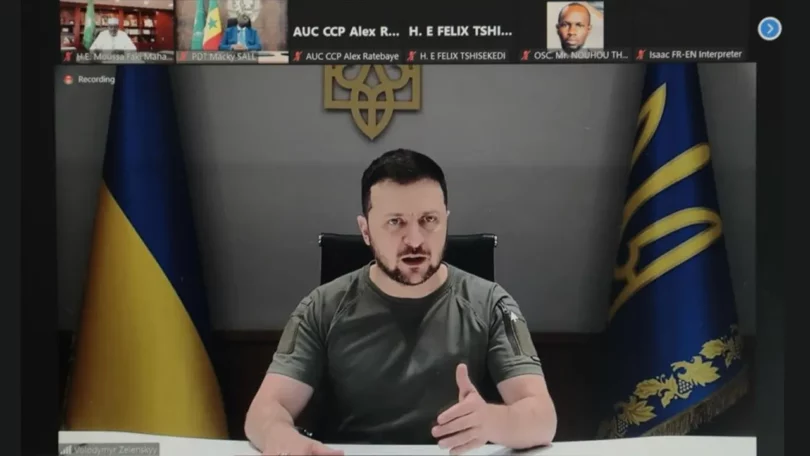(Se puede leer esta nota en español aquí.)
Western governments have tried to rally the nations of Africa to join their war on Russia. But the vast majority of the continent has ignored their pressure campaign.
For months, Ukraine attempted to organize a video conference between the African Union and Western-backed leader Volodymyr Zelensky.
France and Germany put heavy pressure on African governments to attend the Zoom call, which was held on June 20.
The conference ended up being a total failure, however. The heads of state of just four of the 55 members of the African Union joined the meeting.
In other words, 93% of the leaders of the African continent did not attend the video conference with Zelensky.
This was a clear sign of Africa’s overwhelming neutrality in the proxy war between the West and Russia.
France’s major newspaper Le Monde described Zelensky’s video call as “an address that the African Union (AU) has delayed for as long as possible and has been keen to keep discreet, almost secret.”
Ukraine had tried to organize the conference since April, but the AU had repeatedly pushed it back.
Le Monde noted that “the organization of the simple video message illustrates the tense relationships between Mr. Zelensky and the leaders of the continent,” who are “sticking to a neutral position.”
Citing an internal source, The Africa Report identified the very few African heads of state who attended the call as Senegal’s President Macky Sall, Côte d’Ivoire’s President Alassane Ouattara, and the Republic of the Congo’s President Denis Sassou Nguesso.
Also at the video conference was Mohamed al-Menfi, the leader of the Libyan Presidential Council, which is recognized by some countries as a legitimate government, although this is disputed by many nations, and Libya has remained territorially divided since a 2011 NATO war destroyed the central state.
At the meeting with Zelensky, these three or four heads of state were joined by Moussa Faki, a politician from Chad who serves as chair of the African Union, and some lower level diplomats of other countries.
The African Union apparently tried to keep the conference as quiet as possible. It did not post anything about the call on its official website. It did not tweet about the meeting either.
The only official recognition of the call came from Faki, in a lone tweet, in which he cautiously “reiterated the AU position of the urgent need for dialogue to end the conflict to allow peace to return to the Region and to restore global stability.”
The United States and European Union frequently claim that they are acting on behalf of the “international community,” but events like this demonstrate that when Washington and Brussels say international community, they actually just mean the roughly 15% of the global population in the West and their loyal allies in Australia, New Zealand, South Korea, and Japan.
Multipolarista detailed in a report in March how the vast majority of the world’s population, which resides in the Global South, has remained neutral over the Western proxy war in Ukraine.
Countries with some of the largest populations on Earth, such as China, India, Pakistan, Brazil, Ethiopia, Bangladesh, Mexico, and Vietnam, have remained neutral.
Many more nations in the Global South, such as South Africa, Iran, Venezuela, Cuba, Nicaragua, North Korea, and Eritrea, have openly blamed NATO and the United States for causing the war in Ukraine.
Establishment British newspaper The Guardian, which is closely linked to UK intelligence agencies, published an article in March reluctantly acknowledging that many African countries “remember Moscow’s support for liberation from colonial rule, and a strong anti-imperialist feeling remains.”
The report noted that a significant number of African leaders are “calling for peace but blaming Nato’s eastward expansion for the war, complaining of western ‘double standards’ and resisting all calls to criticise Russia.”
It conceded that nations like South Africa, Zimbabwe, Angola, and Mozambique, “are still ruled by parties that were supported by Moscow during their struggles for liberation from colonial or white supremacist rule.”
Russia today also has important trade relations with Africa. As one of the world’s top producers of wheat, Russia is a significant source of food for the continent.
While food insecurity is an endemic problem in formerly colonized nations in Africa that were ravaged by centuries of Western imperialism, the United States has threatened to make this crisis even worse.
The New York Times reported that the US government is pressuring food-insecure countries in Africa not to buy Russian wheat.

